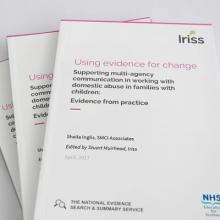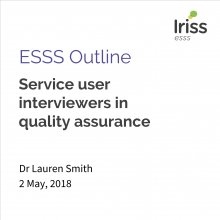This summary describes the findings from a project to improve research use in Apex Scotland, and to share the learning with others. There are specific reflections likely to be of interest for other third sector organisations and for academics. Further details about this project, including a report about the project, can be found on the Improving research use in the third sector: Project report.
Introduction
Apex Scotland is a third sector organisation working throughout Scotland to improve the lives of people who have offended or are at risk of offending. They are involved in a range of interventions: from developing employment skills, running a school inclusion unit, and providing drug and alcohol treatment and support.
This summary describes the findings from a project to improve research use in Apex Scotland, and to share the learning with others. There are specific reflections likely to be of interest for other third sector organisations and for academics.
What we found
- The project helped to raise awareness of research evidence and the associated benefits it can offer.
- For individual staff members, the project helped raise awareness of specific pieces of evidence and helped individuals work through potential implications and ways of using relevant evidence to inform their work.
- There was a real interest and appetite for using research across the organisation. In particular, in general, Apex staff enjoyed being asked to consult research and many did so when asked to do so.
- Research champions have emerged and have self-identified
- throughout the placement period. These are generally not the initial champions recruited before the project began, who were largely nominated by managers.
- The project provided support for those interested in championing research evidence, and energised those with this interest.
- Research is still seen as an additional task, often not seen to be part of people's responsibilities, not for everyone and not a priority. Therefore, people do not perceive they have time to reflect on research.
- It was difficult to ensure research activities were jointly owned, let alone led by, Apex staff (with the placement holder tending to fulfil this role).
- On reflection, more could have been done to link the need for better evidence use with wider developments across Apex around organisational development, improvement and change, which may have helped to secure commitment for specific activities.
- There is real potential for the work undertaken during this placement to help Apex further develop and grow as a learning organisation, though to fully capitalise on the work to date would require an organisational commitment to take this forward.
Reflections for third sector organisations
Whilst this project generated a range of lessons and suggestions for Apex Scotland to explore, wider lessons and ideas have emerged that other third sector organisations interested in improving their use of research, may find useful.
- Champions: There can be value in identifying, encouraging and supporting research champions, who have energy and commitment to improve research use. These champions can be either members of the third sector organisation or from external organisations, and can play a leading role in demonstrating the value of research across the wider organisation. If there is an obvious champion within their organisation they may be willing to take on the role of a nominated lead for improving research use, and potentially coordinate and support a range of research related activities. If there are several champions with an interest in supporting improvements in research use there may be value in setting up a working group to explore research findings and their potential implications for the organisation, and to inform and coordinate activities to improve research use.
- Research tasks: There may be an unknown appetite for reflecting on research findings in your organisation which has never been uncovered because people have never specifically been asked to consult research. Therefore, a potentially quick and easy way to encourage greater research use amongst individuals in your organisation may be to ask your staff to consult a piece of research, and perhaps discuss it at a future team meeting or write down and share their reflections on what the research may mean for them.
- Research is for you!: People working in third sector organisations, particularly those in service delivery roles, often don't think research is something for them to engage with, either thinking its not part of their job, it's just a task for senior members of staff or its for policy focused staff. There also appears to be something about the term 'research' which is a barrier for people, perhaps particularly front-line practitioners. Therefore, there can be value in paying particular attention to demystifying what research is, and specifically encouraging and supporting research use amongst different types of staff at all levels in the organisation.
- Organisational commitment: There are a range of methods third sector organisations could employ to demonstrate their commitment to being evidence-informed, such as:
Create a report setting out the evidence base for your organisational aims, outcomes and activities.
Add keeping up to date with research evidence as a specific requirement in job descriptions, criteria for promotion and encourage this to be identified as a developmental area in appraisals.
Ensure the induction process makes it clear if consulting research is considered to be part of staff roles, and if so provide training or other forms of support.
Invest in building internal research capacity through funding posts (or applying for funding) to support the use of research and evaluation, or look to commission research and evaluation of direct relevance to your organisation. There is potential here to explore ideas with university and college staff who may be looking for projects for their students.
Make reference to the evidence base a requirement in business case, project planning and related documentation.
Provide dedicated time for staff to consult research or conduct small scale research projects.
- Away Days and team meetings: Use existing meetings as spaces to consider further research reflection, perhaps encouraging discussion of particular pieces of research in team meetings or using away days to allow deeper reflection away from the day to day work pressures.
- Engage with researchers: There can be value and mutual benefits in increasing engagement with researchers who are interested in similar issues to your organisation. Academics in particular are currently under pressure to demonstrate the impact of their work outside universities, so may be interested and willing to engage (which does not always need to involve payment). There are different ways to strengthen relationships, some potential ideas could include, encouraging researchers to become board members, developing joint projects with researchers (perhaps jointly applying for funding), offering student placements, undertaking job shadowing, and delivering lectures to students about your work in exchange for academic input into a workshop for your organisation.
Reflections for academics
Academics and other researchers who are interested in improving the use of their research across the third sector may find some of the ideas and reflections below of interest.
- Time is short (for everyone!): So resources which are short and clearly explain the implications of research for policy and practice are really valuable to those outside academia. Obviously time is also short for you, so there are simple and effective ways of sharing your research, such as recording a 5 minute talking head or podcast to explore the potential implications of your research findings for the third sector. Once you've produced one, this becomes a much quicker way to communicate than writing briefing papers or other resources.
- Raise awareness of your research: There is often a lack of awareness of and/or an ability to access research resources in the third sector. Although it can feel a little like self-promotion colleagues in the third sector often value being notified when you produce research which may be of interest to them (through email, twitter, word of mouth etc).
- Step into third sector shoes: It can be difficult for researchers to maintain awareness about the problems facing the third sector and to clearly understand what their research could mean for those working in policy and delivery roles. To strengthen this understanding, there can be value in building relationships with third sector colleagues, whether through sitting on third sector boards, undertaking formal or informal work shadowing, secondments and placements, engaging in joint projects (research or knowledge exchange), applying for funding with a third sector partner, or asking third sector colleagues to read your work and comment on its relevance to them.
- Valuing other forms of knowledge: Those working in third sector organisations in policy and practice roles have knowledge and experience of different forms. There is value in academics reflecting on this and using engagement opportunities to learn as well as to share their knowledge. Traditional dissemination models, such as lectures, do not lend themselves to this form of exchange and sharing, so there may be value in thinking creatively when planning events.
- Direct contact is important: Building one to one relationships is key to supporting the use of research in the third sector. Therefore, there can be real value in investing time to meet with third sector colleagues face-to-face.
- Improving research and increasing impact: It can be the case that investing time in supporting third sector colleagues to understand and use your research does not just improve the impact of your work but this also has the potential to inform the production of better research; for instance, through providing challenge and feedback about your findings.
This details the findings of a project to improve research use in the third sector undertaken between July 2011 - July 2012, funded by the ESRC and Apex Scotland (RES-173-27-0231).





